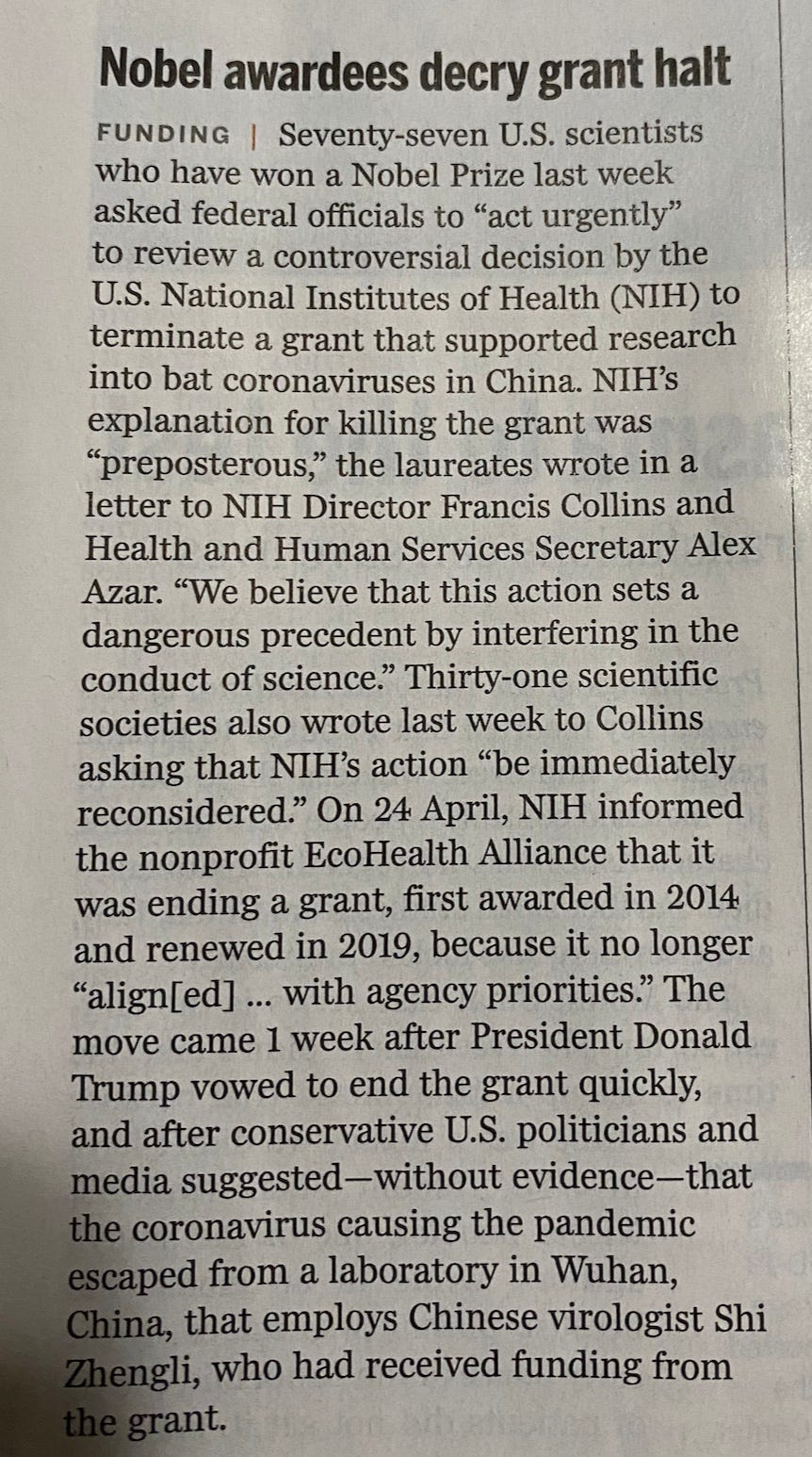The article below I photographed from Science magazine, 1 week after Trump said he was taking away a grant to EcoHealth Alliance for its work with the Wuhan Institute of Virology on coronaviruses.
Below, the Defender today reprinted an article by Rob Verkerk published initially by the Alliance for Natural Health. I had been waiting for something like this.
https://childrenshealthdefense.org/defender/nobel-prize-summit-real-science/
How the Nobel Prize Summit Sold Out on Real Science
Despite noble ambitions, the 2023 Nobel Prize Summit in Washington, D.C., looked more like a breeding ground for artificial intelligence-infused dogma and big corporate-backed pseudoscience.
By Rob Verkerk, Ph.D., and Paraschiva Florescu
The Nobel Prize Summit held May 24-26 in Washington, D.C., showcased how the war against the “viral infection” of misinformation and disinformation is to be fought by academic institutions, the mainstream media, social media companies and governments.
The summit’s title, “Truth, Trust and Hope” is a reflection of a view held by the organizers and their backers. They uphold that unless this war is won, public trust in science is done for.
You may not be surprised to learn that cancel culture and artificial intelligence (AI) are expected to play key roles in the battle strategy against “scientific misinformation.”
“The great thing is not having a mind,” writes Nobel Laureate Louise Glück, in her poem “The Red Poppy.”
And what a great thing indeed, for having a mind is perhaps one of the biggest obstacles in the way of authoritarianism and the hunger of a few for extreme power.
People’s minds can be either a tool to further an agenda, or a hindrance to achieving it. It depends on what perspective you choose to look at it. We’ll explore the idea of perspectives throughout the article.
Mouthing off, Beckett-style
The Nobel Prize Summit began by putting the assembled in-person and virtual audience into an almost trance-like state with a performance piece about mis- and disinformation by film producer Smriti Keshari.
Warning: don’t be put off by the performer’s disembodied mouth, the words which emanate from it are too insightful to be ignored — this is art, for corporate science protectionism’s sake!
Extracts of the monologue from Keshari’s performance piece at the Nobel Prize Summit:
“Were their eyes or ears or nose or memory, playing tricks on them? … Did they see something that wasn’t there? … What were they to believe? …
“Disinformation’s web, tangled threads of falsehood spread, truth obscured, misled.”
It turns out Keshari’s piece was inspired by Samuel Beckett’s 1971 monologue “Not I” which is delivered in a similar way: via an illuminated, seemingly disembodied mouth.
Keshari borrowed another idea from Beckett’s work in which the previously voiceless protagonist begins to doubt her ability to find her voice as well as her own memory, coming to the conclusion that “memories could be false.”
Nobel Prize Summit listeners were taken on an emotional journey, which included 130 years of Nobel prizeworthy discoveries as well as an “experience” of what some may consider misinformation and disinformation.
Reading between the lines
The objective of the performance piece was clearly to show how people can be misled into believing conspiracy theories.
The proposed mechanism for misleading people, which has a cogent scientific basis, involves juxtaposing fear through fear-mongering with the exploitation of our innate attraction to the unexpected.
Surprise and anticipation, like fear, are actually primary emotions and therefore are very powerful drivers of human behavior. With careful calibration of these various factors, people can be led to believe all sorts of things, some of which will turn out not to be true.
While the mechanism is widely recognized, we were concerned about the assumptions being made over who is deploying which type of misinformation or disinformation, consciously, subconsciously and unconsciously, and to what end.
To be more specific, and by way of example, the scientific establishment represented at the Nobel Prize Summit would likely argue that any view that purported that lockdowns, masks or vaccines did more harm than good during the COVID-19 pandemic period (2020-2022) should be categorized as scientific misinformation….
Here is the rest of the article.




















No comments:
Post a Comment